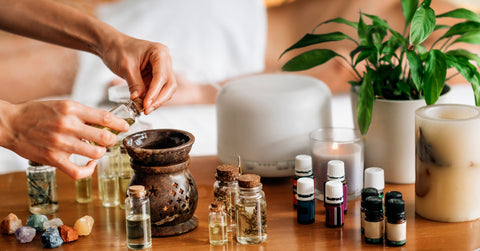How To Safely Use Your Essential Oils

Essential oils are becoming a more popular treatment for everything and with good reason. This is because they offer remedies to many treatable health conditions without the nasty side effects that prescription medications might bring with them.
What Do Essential Oils Do?
Aromatherapy is a science as well as an art that focuses on the use of the aroma provided by essential oils for their overall therapeutic value as well as enhancing your attitude and general well-being. The essential oils that you have read about and seen are essentially aromatic isolates of a distilled plant material.
Steam distillation is one of the most common forms of extracting essential oils, but not all plants will contain the volatile oils that can be extracted in this way. There are some plants that require a sort of solvent in order to bring that aroma out. Others, however, can be cold-pressed, which is the case with essential oils of a citrus nature.
Because of this, it is very important to know that the essential oils that you are using are very concentrated as well as potent concoctions. I’m saying this because a little will go a long way and you don’t want to drown yourself in the pungent odors that an essential oil offers.
If for nothing else, the use of essential oils will provide a pleasant aroma that will leave you feeling like you are breathing in the freshest scents the earth has to offer all day long. Even if that is the only thing that you can take away from its use, you will come away with a useful item.
It is important, however, to make sure that you are using essential oils correctly and in a way that is safe for you and those around you. There are three main ways that you can use essential oils to your advantage and we will walk you through those.
1. Aromatic

Considered one of the safest ways to use your essential oils. You can use the aromatic aspect of essential oils in two main ways that have gained popularity over the last few years as essential oils have gotten more popular. The first being an oil diffuser, and the second is making your own aromatherapy inhaler.
2. Oil Diffuser

The use of essential oils through a diffuser is one of the most popular and safest ways to use them. With a diffuser, most commonly used in homes or offices, you can put a few drops of essential oil into the diffuser which will release those aromas into the air. This can result in a number of different benefits, especially in health and wellness and improving the overall smell of the area.
Diffusers are super simple and easy to use which makes them a popular option in a variety of different settings. Get the most out of your essential oils by implementing a diffuser into your life and you will see the benefits immediately.
3. Make Your Own Aromatherapy Inhaler

Using essential oils in this manner is a bit trickier to pull off, but it definitely has its benefits. You want to put about 15 drops of essential oils into a small bowl. After you have done this, you will place a small wick into the bowl that will soak up the oil.
After the essential oils have soaked into the wick, you can place the wick into an inhaler tube and make sure the cover is closed. You can use the inhaler multiple times throughout the day to take and it makes for not only an instant remedy but an on-demand source of aromatherapy as well.
4. Directly Into Your Palm

This is both the easiest and quickest method of implementing essential oils into your life. It is important that you make sure to check that the essential oils that you plan on using are okay for use on the skin. The last thing you want is for an essential oil to leave your skin irritated. You may do a patch test to ensure that your skin is not sensitive to them since most essential oils are highly concentrated.
Simply put a few drops of essential oil into the palm of your hand and rub your palms together. When you feel as though the oils have mixed in thoroughly, inhale deeply but keep them away from your eyes as they can definitely be irritating to your eyes if you get them too close.
5. Steam Inhalation

As is the case with oils that you use on your skin, make sure that you have oils that have respiratory benefits so as to not irritate your respiratory system. Once you find the oils that you need, you will grab a bowl, some hot water, and a towel. You will then heat up the water in a pan or teapot and fill your bowl around the halfway point with that hot water.
After that, add a drop or two of your essential oil, put the bowl on the counter, and then hold your face over the bowl. Make sure that your eyes are closed when you do this. If the temperature is comfortable, put the towel over your head and do a minute or two of deep breathing. You can do this anywhere from three to five times per day to get the most out of the aromatics.
6. Topical

It is important to note that if you plan to use essential oils topically, you want to do so by first implementing a carrier oil like avocado, almond, or perhaps a jojoba oil to dilute them. The dilution ratios can depend on several things: the essential oil that is being used, the area in which it is being applied, the age of the person applying the oil, and whether or not they have medical conditions or sensitive skin.
Make sure that you adhere to these guidelines when you apply essential oils so as to avoid irritation or unwanted reactions to your skin that could be very uncomfortable to deal with.
Dilution Chart
Here is a dilution chart that you would want to use to give you a good idea of the amount of topical oil usage:
1% = 5-6 drops of the essential oil per ounce of the carrier oil
2% =10-12 drops of the essential oil per ounce of the carrier oil
5% = 25-30 drops of the essential oil per ounce of the carrier oil
10% = 50-60 drops of the essential oil per ounce of the carrier oil
Don’t forget: a dilution of 1% is considered to be the safest use for most any essential oil. Also worth consideration is that some oils, like clove or cinnamon, are considered to be hot and have recommended dilutions that should be no more than 0.5% and it is important that you follow these recommendations so you don’t have to experience some unpleasant results.
Also worth noting is that there are essential oils that can definitely increase how sensitive your skin is to sunlight. This is known as photosensitivity and it mostly occurs with citrus oils. Things like grapefruit, bergamot, lime, and lemon are the most notable ones for causing this type of reaction.
With these oils, if there is UV exposure to your skin, they can cause some serious burns. Make sure that you avoid topical use with these kinds of essential oils if you are going to be exposed to UV rays shortly afterward.
Here are a couple of different essential oil suggestions for topical use:
7. Aromatic Bath

All you have to do is add anywhere from a few drops to around a teaspoon of your favorite essential oils and pour that concoction into a bath. As always, be aware of the strength of the oils you are using because some of them can be very strong.
With the right oils, you get a beautiful smell that will have you feeling great as you soak in the tub, feeling more relaxed than ever before.
8. Aromatherapy Massage

You should always keep in mind that essential oils are very, very concentrated. That is why a 2-3% dilution rate should work well enough for most healthy adults. That means using no more than 18 drops of your favorite essential oil per ounce of your carrier oil.
9. Internal

The third way that you can use your favorite essential oils is through internal use. This is not a recommended usage for essential oils even though there are some that are used in the flavor and food industry. If you have direct supervision from a health practitioner that is qualified, that is the only recommended way to use essential oils internally.
What Factors Might Influence The Safety Of Essential Oils?
There are more than a few things to take into consideration when thinking about the overall safety of the essential oils in question. This is by no means a science, but these are guidelines that you might want to follow when choosing an essential oil to use.
Chemical Composition
Essential oils can be made up of potentially dozens of chemical components that effectively make up the therapeutic traits as well as the aromatic profile of the oil. There are some chemicals that can cause skin irritation or can even cause some sort of drug interaction.
Being aware beforehand of what the possible effects are can help you know whether or not they are safe to use. You can probably still use them in any event, just in much smaller dilutions than normal.
Quality
It is important to know that the quality of essential oils can vary drastically when it comes to the market. You want to get pure essential oils in order to get the full aromatherapeutic benefits and because there is no regulatory body for this, it is possible to get an essential oil that isn’t of the highest quality.
There are plenty of essential oils that can be altered with less expensive synthetic oils, chemical isolates, or vegetable oils in order to extend that oil and increase the overall profit margin. Knowing your supplier is a good way to dictate the quality you are getting. As with anything else, do your homework and you won’t be taken by surprise.
Dilution
The vast majority of topical applications when using essential oils will use anywhere from 1% to 5% dilutions. Know this: as the dilution percentage rises, so too does the risk of bringing on things like skin irritation. Proceed with caution if you plan on using higher dilution percentages.
Application
Not all methods of application provide the same amount of risk when it comes to potential irritations. Aromatic usage presents the lowest risk of irritation than the other forms, for example. It is important to know what safety precautions are to be taken into consideration as well as to use caution and common sense.
Age Of The User
Essential oils will not have the same effect on all ages. For example, infants and younger children might be more sensitive to those essential oils than a healthy adult would. For this reason, essential oils should be used in a highly diluted manner. If you have sensitive skin, use caution before applying essential oils because they can lead to a lot of skin irritation.
As you can see, essential oils provide a huge range of health benefits as well as simply having a great smell. The key, like anything else, is to know how much is enough for you specifically and what dilutions are the best for you. Going into the process recklessly can result in serious irritations or other health issues that you will not want to deal with.
If used carefully, essential oils can really change your well-being. Not only does it have proven health effects, it can have a great effect on your attitude and mental health as well. And the health benefits of essential oils are not fully discovered yet. We are learning more and more about them, making them even more valuable with every piece of information.
Get in on the growing trend and get the health benefits that can change your life.

